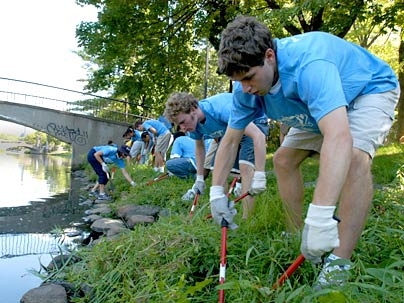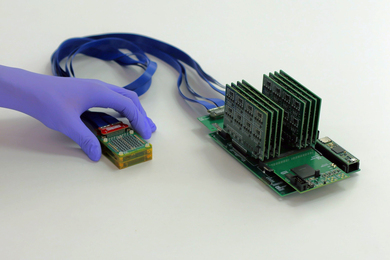MIT faculty advised freshmen yesterday (Sept. 1) to pursue their personal educational interests, then use what they learn to help the world.
President Charles M. Vest welcomed his 15th freshman class to MIT during the annual freshman convocation in Kresge Auditorium by encouraging the students to use their knowledge of science and engineering to tackle society's biggest problems.
"Develop your individual talents but also please look beyond yourselves," Vest said. "Master your disciplines, but think creatively about their applications."
"We live in a world that is dangerous but full of hope, a world that is increasingly dependent on science and technology and defined by advances in science and technology. Foremost in our minds these days is peace and security. But it is a time for optimism, not a time to get mired down in problems and fears. It is a time to take on the challenges," Vest said.
Striking a more personal note was Professor David Mindell, who showed slides from some of his deep sea archaeological voyages and encouraged the frosh to make their education conform to their real interests. "Doing what you love is the essence of a great education," said Mindell, the Dibner Associate Professor of the History of Engineering and Manufacturing in MIT's Science, Technology and Society Program, and an associate professor in the Systems Engineering Division. "Don't feel constrained by how people have done things in the past."
Mindell entered Yale as a freshman 21 years ago with the intention of majoring in electrical engineering. And he did. But during his freshman year one of his mentors helped him to realize that a focus on engineering didn't preclude learning more about his other passion--literature. So Mindell took a double major ("the single most important decision of my career") and wrote his senior thesis on Thomas Pynchon's "Gravity's Rainbow." A key metaphor of that post-modern novel is based in engineering, said Mindell, who just happened to have the education to recognize it.
Now he looks at the ways that technology affects our world. And he uses his electrical engineering background to develop underwater robots and sonar technologies to map out ancient shipwrecks at the bottom of the ocean floor.
His second piece of advice was to develop relationships with mentors.
"The quality of your relationships with your mentors will determine the value of your education," he said, repeating the statement for emphasis. "Each semester, get to know at least one researcher or professor as a person and let him or her get to know you. How? Just appear on their doorstep and knock on the door."
Class of 2008 by the numbers
Applications
2008: 10,466
2007: 10,549
Accepted
2008: 1,665
2007: 1,735
Enrolled
2008: 1,081
2007: 1,021
Yield
2008: 65%
2007: 59%
Male
2008: 622
2007: 560
Female:
2008: 459
2007: 461
Percentage of Women
2008: 42%
2007: 45%
No. of States and D.C.
2008: 51
2007: 50
Countries and territories
2008: 60
2007: 48
Class of 2008:
African American - 6%
Asian American - 26%
Hispanic - 12%
Native American - 2%
White/Caucasian - 35%
Other/no response - 13%
International students - 7%
A version of this article appeared in MIT Tech Talk on September 15, 2004 (download PDF).






